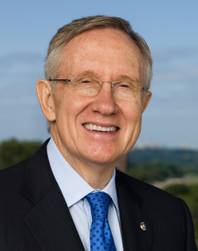Sunday, Feb. 13, 2011 | 2 a.m.
View more of the Sun's opinion section

Harry Reid
Sun Coverage
Sun coverage
Next year is shaping up to be a make-it or break-it moment for Nevada, as one Silver State senator stares down what’s looking like a brutal fight for his political fate.
No, I’m not talking about John Ensign.
For the past four years, Nevada’s somewhat incongruous heft in the U.S. Senate has come on the back of Harry Reid and his rank as majority leader.
But if he can’t hang on to at least 20 of the 23 seats up for grabs in his caucus a year from November, Reid will shift to the minority, where his influence will, by definition, fade.
It’s a possibility that few considered a few short months ago, when Reid staged a Lazarus-like comeback to keep his seat, carefully but handily defeating his Tea Party challenger, Sharron Angle.
But a meticulously organized ground game isn’t going to help him this cycle.
Instead, it’s going to depend on what the Democratic Party can roll out in places such as North Dakota, Connecticut and Virginia — three states whose sitting Democratic (or in the case of Connecticut, Democrat-leaning) senators have announced their retirements in the past few weeks.
“Half the battle for these things is in the recruitment of candidates, and there are some natural Republican candidates that look good in those races,” Nevada-based Democratic strategist Dan Hart said. “While some of those seats may look Republican today, you have to take into account that we’re going to be in the middle of a presidential election where a president’s trying for re-election.”
But should they come up short, retirements announced thus far are enough to entirely erase the Democrats’ Senate majority of 53 seats, with the help of the independents who swing to their side of the aisle.
By announcing early, the outgoing senators have certainly given Democrats in their states time to find good challengers. But that isn’t stopping Republican powers that be from salivating.
“Sen. (Jim) Webb’s decision not to seek re-election makes Virginia an even stronger pickup opportunity for Republicans in 2012,” chief National Republican Senatorial Campaign Committee spokesman Brian Walsh said in a statement after Webb announced last week his retirement. “While there is no doubt Republicans will field a strong leader as our nominee, Democrats will have great difficulty finding an electable candidate for this open seat as Virginians continue to reject their agenda of higher taxes and reckless spending.”
Retirement announcements have come on the Republican side of the Senate, too: Texas’ Kay Bailey Hutchison and Arizona’s Jon Kyl recently announced they would be bidding the Capitol adieu.
Although Republicans are departing Republican strongholds, Democrats are leaving seats that they haven’t been able to call their own for very long. Webb won a narrow victory in Virginia 2006, after incumbent Republican George Allen made the politically suicidal mistake of calling a Democrat activist a “macaca” at one of his rallies. (Allen, incidentally, is looking to reclaim his seat.)
Even with that gift, Webb, a conservative Democrat, was only able to scratch out a 53.5 percent victory.
In North Dakota, a Democratic stronghold in the Senate for the past 18 years, Kent Conrad’s announced retirement opens the doors for Republicans to stage a takeover like they did in 2010, when North Dakota’s John Hoeven took over Byron Dorgan’s seat in the easiest flip of that midterm cycle.
But two years is a long time to campaign, and Reid seems to have that time table in mind. He has taken steps to do all he can to shore up the public face of the Senate Democrats, including bringing his policy messaging nerve center into lock-step with the party’s political broadcast wing under New York Sen. Charles Schumer. Analysts say he’ll be working to help field and fundraise for able contenders in the states with the most critical races — though probably from behind the scenes, as Reid is not a particularly able orator, and could too-easily become a GOP target, à la Nancy Pelosi in 2010.
So far though, he’s shrugging off any suggestion that the Senate could flip.
“I am confident we will hold the majority next Congress because elections are about choices,” Reid said. “The choice could not be clearer between Democrats who are focused on creating jobs and cutting wasteful spending, and Republicans who have taken their eye off the economy to fight old battles like repealing health insurance reform and protecting
$20 billion in government giveaways to oil companies already making record profits.”

Join the Discussion:
Check this out for a full explanation of our conversion to the LiveFyre commenting system and instructions on how to sign up for an account.
Full comments policy